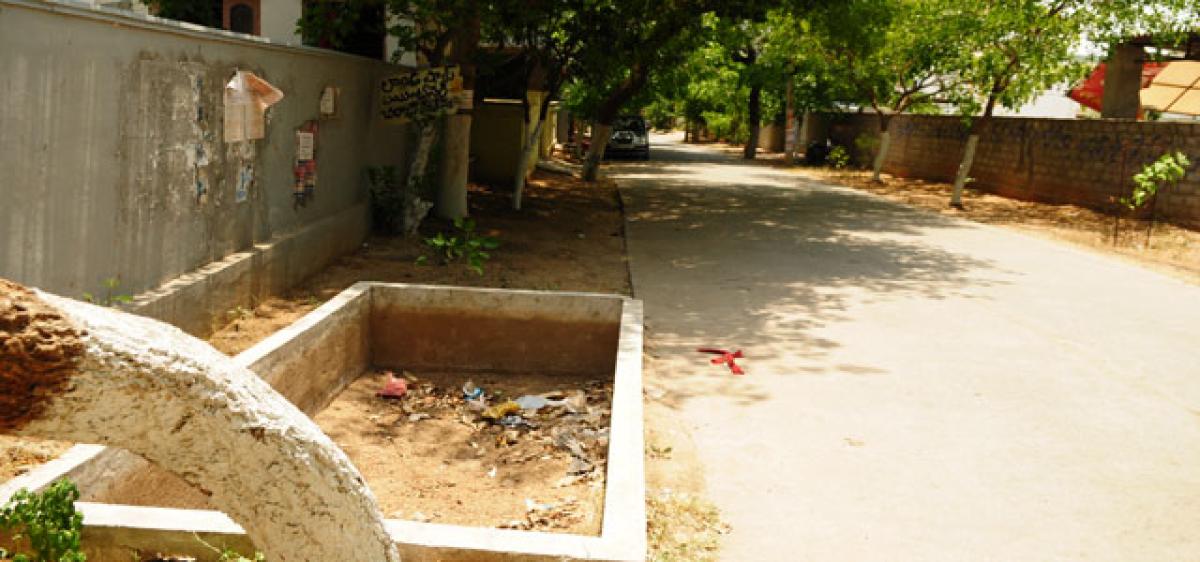Live
- Ahsaas Channaopens up about her complex character in ‘Mismatched 3’
- Radhika Apte welcomes first child, shares heartfelt post
- Jacqueline dazzles at Da-Bangg Reloaded concert
- Time to boost measures to prevent drowning, save children: WHO
- TDP achieves milestone with 73 lakhs membership registration, says Chandrababu
- South Korea: Main Oppn hails Yoon's impeachment motion passage as 'victory for people, democracy'
- RG Kar issue: Tension flared over parallel protests by Congress, SUCI(C) outside CBI offices
- After furore, Central Railway revokes order to raze Lord Hanuman Temple at Dadar
- Now hoteliers' body in Bengal's Alipurduar shut doors for Bangladeshi tourists
- District Collector Encourages Students to Utilize Government Facilities for a Better Future
Just In

Collective effort of about 600 residents of the Cooperative Bank Colony near Nagole to catch every drop and harvesting rainwater paid dividends as the residents face no groundwater shortage for the last 28 years.
Collective effort of about 600 residents of the Cooperative Bank Colony near Nagole to catch every drop and harvesting rainwater paid dividends as the residents face no groundwater shortage for the last 28 years. “In 1989 the groundwater level in the area was about 90 feet. Even in the peak summer this year it remained at about 85 feet,” informed the Colony Welfare Association president Satish Reddy.
“It was the collective resolve of the residents that we could achieve this,” he beamed. “We followed a tier strategy for this. On the one hand we took multiple steps in harvesting rain water. Secondly, we don't allow over exploitation of the groundwater in the colony,” he shared.
Recounting the beginning of the idea, Reddy said, “I thought about harvesting rain water when I was reconstructing my house in 2011. Around that time, adjacent areas in the vicinity and elsewhere in the city had been reeling under shortage of groundwater and ordering for water tankers was the order of the day, particularly during summer.”
“To avoid that situation, I constructed a rainwater harvesting pit in my house. Then, I wanted to spread this in the colony, so that, every one could benefit from it,” he added. At meeting of the Colony's Welfare Committee it was decided to go home-to-home and convince the residents to opt for rain harvesting pints. “We now have these pits at the rooftop of every house,” said a proud Reddy.
Another prominent parameter that works in the colony's favour to save water is the roads in the area. “There are about 20 cement roads in the colony with no chance of the rainwater sinking into the ground. So, we invested from the Welfare Society funds to ensure that the margins should be lower about an one inch than the colony's internal roads. This way, we diverted the rain water on the roads to gather in the road margins,” said Reddy.
There are 1,200 trees planted in these margins. Ahead of every rainy season the residents participate in Srama Danam programme during which they do earth work and prepare root plates for every tree. “This helps the water to divert into the road margins and gets absorbed into the ground.
At different places in the margins we have constructed rain water harvesting pits so as to to take care of flow of huge water quantities during heavy rains.” “That apart, arrangements are made for the excess rain water to go into vacant plots in the colony. So, all these efforts in turn absorb maximum rain water into the ground in our colony,” he said.
In addition, residents don't allow any house hold or builders constructing apartments in the area to lay bore-wells at more than 200 feet. Members of the society in person will be present at the time of digging bore-wells to ensure compliance to the rule. “This has prevented over exploitation of groundwater table. This has a positive effect and there is plenty of groundwater available at much below the depth of 200 feet in the area,” says Reddy.
“Preventing over exploitation helped us maintain ground water availability to all the residents in the colony for the last 28 years. While one has to go as deeper as 1,000 feet in the nearby areas for groundwater,” said the Colony Welfare Society secretary Anji Reddy. Faced with the dwindling levels of the groundwater availability in their areas office bearers from different colonies are paying visit to the Cooperative Banks Colony to learn their practices and to replicate the same to reap benefits of rain harvesting.

© 2024 Hyderabad Media House Limited/The Hans India. All rights reserved. Powered by hocalwire.com







